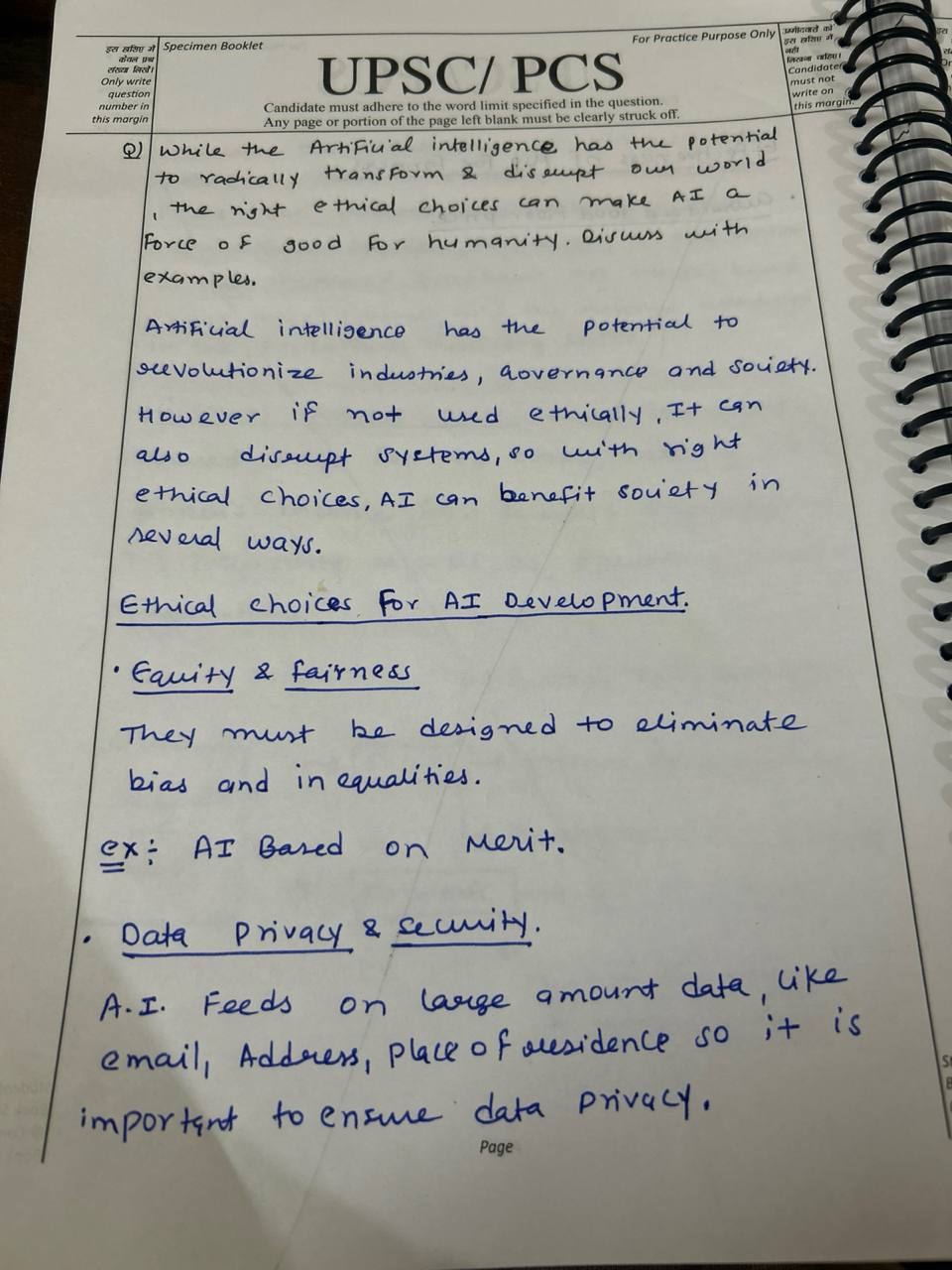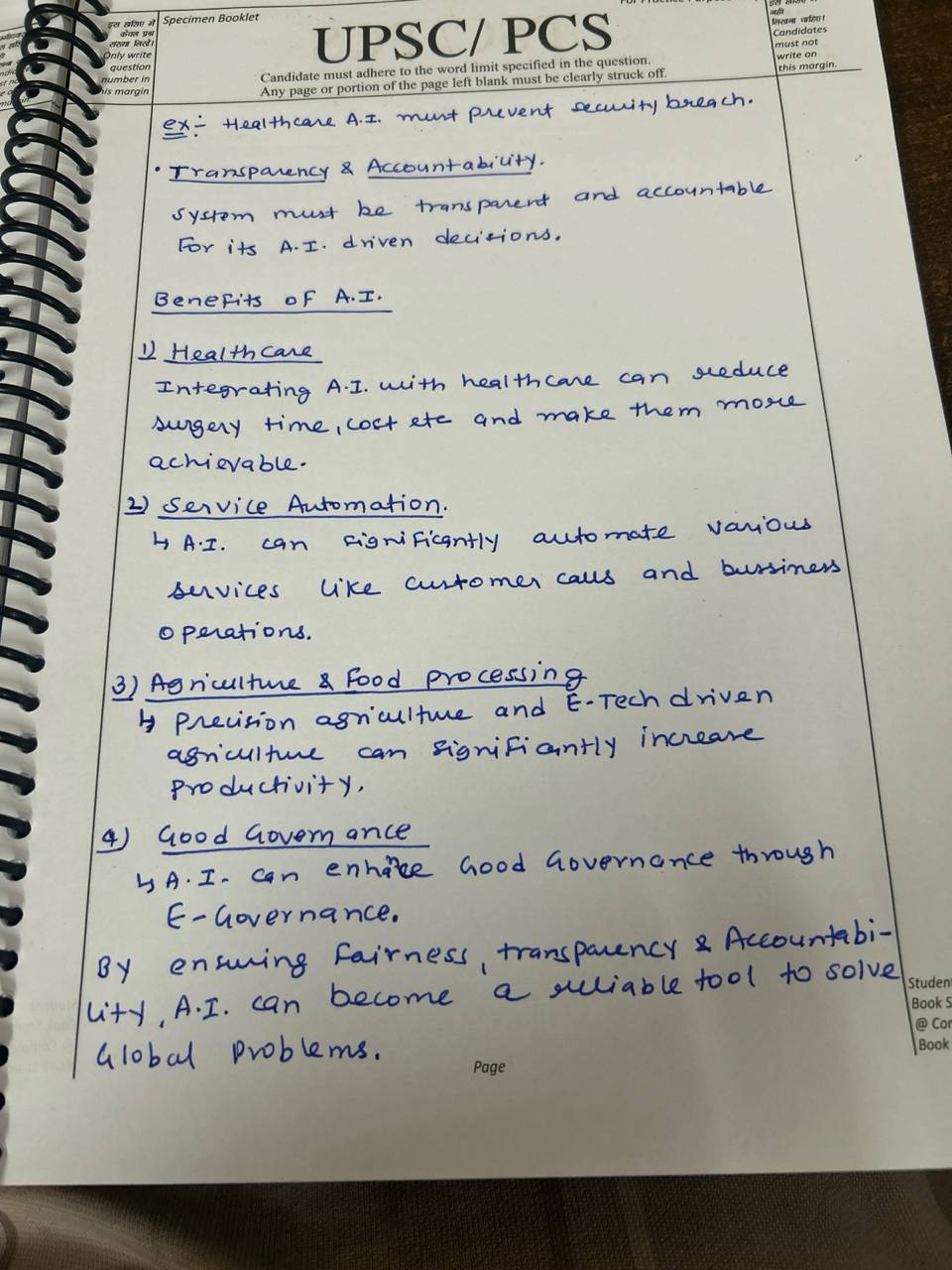Law, democracy, and even the market economy cannot survive in the absence of generally accepted and deeply ingrained moral commitments and ideals. What does this statement mean to you? Give an example in the context of today’s world. (150 words) ...
- Recent Questions
- Most Answered
- Answers
- No Answers
- Most Visited
- Most Voted
- Random
- Bump Question
- New Questions
- Sticky Questions
- Polls
- Followed Questions
- Favorite Questions
- Recent Questions With Time
- Most Answered With Time
- Answers With Time
- No Answers With Time
- Most Visited With Time
- Most Voted With Time
- Random With Time
- Bump Question With Time
- New Questions With Time
- Sticky Questions With Time
- Polls With Time
- Followed Questions With Time
- Favorite Questions With Time
Mains Answer Writing Latest Questions
Despite the fact that artificial intelligence (AI) has the power to drastically alter and upend our world, Al can be a positive force for humanity if it makes the correct moral decisions. Talk about it with examples.(Answer in 150 words)
Roadmap for Answer Writing 1. Introduction Purpose: Briefly introduce the importance of ethics in public relations (PR) and its role in private organizations. Key Focus: Mention that PR is responsible for managing relationships with the public and maintaining the brand’s reputation, which is ...
-
Best AnswerThis answer was edited.
Model Answer Ethical considerations play a crucial role in shaping how public relations (PR) is managed in private organizations. By promoting transparency, fairness, and respect for human rights, ethical practices not only build trust with the public but also strengthen the organization's reputatioRead more
Model Answer
Ethical considerations play a crucial role in shaping how public relations (PR) is managed in private organizations. By promoting transparency, fairness, and respect for human rights, ethical practices not only build trust with the public but also strengthen the organization’s reputation.
- Transparency and Truthfulness
Organizations must be open and truthful in their communications, ensuring that the public receives accurate information. This is vital for maintaining credibility and consumer loyalty. For example, the company behind Dolmio and Uncle Ben’s sauces disclosed high salt and sugar content, advising consumers to consume their products in moderation (source: case examples). - Privacy and Confidentiality
Protecting consumer privacy is essential. Brands like Apple are recognized for their commitment to safeguarding personal data, while failing to do so can harm a company’s image, as seen with Zoom’s privacy breaches (source: case examples). - Respect for Diversity and Inclusion
PR efforts should reflect inclusivity and cultural sensitivity. Hindustan Unilever’s Code of Business Principles highlights the importance of equal opportunity and respect for human rights in its operations (source: company policies). - Avoiding Manipulation
Ethical PR avoids deceptive tactics. The Satyam scam exemplifies the damage caused by unethical manipulation of information (source: case examples).
In conclusion, ethical considerations directly influence how PR is executed, ensuring that it aligns with public expectations and legal standards, thus promoting long-term success.
See less - Transparency and Truthfulness
Roadmap for Answer Writing 1. Introduction Context: Briefly introduce how advancements in technology have led to increased workplace surveillance. Purpose: Mention the purpose of surveillance (monitoring performance, improving productivity) but highlight the ethical concerns it raises. 2. Ethical Issues in Workplace Surveillance This section should ...
-
Model Answer Ethical Issues Arising from Workplace Surveillance The use of surveillance technology in monitoring employee performance raises several ethical concerns: Invasion of Privacy: Tools like location tracking and video surveillance can intrude into personal spaces, particularly for remote woRead more
Model Answer
Ethical Issues Arising from Workplace Surveillance
The use of surveillance technology in monitoring employee performance raises several ethical concerns:
- Invasion of Privacy: Tools like location tracking and video surveillance can intrude into personal spaces, particularly for remote workers, violating privacy boundaries (Source: Content).
- Impact on Creativity: Over-surveillance can stifle creativity and problem-solving skills, as employees may feel their every action is being observed (Source: Content).
- Worker Autonomy: Excessive surveillance, especially in top-down management cultures, can lead to behavior modification, undermining employees’ autonomy and increasing control over personal actions (Source: Content).
- Unequal Impact: Surveillance can disproportionately affect certain groups, reinforcing biases or creating new disparities, especially based on gender, race, or sexual orientation (Source: Content).
Balancing Privacy and Performance Tracking
To mitigate these ethical concerns while effectively tracking performance, companies can adopt the following strategies:
- Transparent Policies: Clear guidelines about what data is collected and why can foster trust. For example, monitoring for security reasons versus personal message monitoring (Source: Content).
- Data Minimization: Limit data collection to only what’s necessary for performance evaluation, such as task completion instead of keystroke tracking (Source: Content).
- Employee Consent: Seek explicit consent from employees, ensuring they understand and agree to monitoring practices (Source: Content).
- Use of Performance Metrics: Focus on output-based metrics (e.g., project completion) rather than intrusive activity tracking (Source: Content).
By implementing these strategies, companies can maintain a balance between respecting privacy and ensuring effective performance tracking.
See less



The Role of Shared Moral Values in the Functioning of Law, Democracy, and Market Economy The statement underscores the importance of shared and entrenched moral values for the effective functioning of law, democratic governance, and market economy. Without these common values, these systems struggleRead more
The Role of Shared Moral Values in the Functioning of Law, Democracy, and Market Economy
The statement underscores the importance of shared and entrenched moral values for the effective functioning of law, democratic governance, and market economy. Without these common values, these systems struggle to achieve their intended outcomes.
Law: Legal systems rely on public trust and ethical compliance. For instance, in recent times, corruption scandals like those involving Satyam Computers have highlighted how a lack of ethical standards can undermine the efficacy of legal frameworks and erode public confidence in the rule of law.
Democracy: Democratic governance depends on public engagement and respect for democratic norms. The recent Capitol Hill riots in the U.S. demonstrate how a breakdown in shared democratic values and respect for institutional norms can threaten the stability and functioning of democratic processes.
Market Economy: A market economy functions on trust and fair practices. For example, the Volkswagen emissions scandal exposed how deviation from moral values and ethical obligations can lead to severe repercussions, including loss of consumer trust and significant financial losses.
In essence, shared moral values are foundational for the effective operation of laws, democratic institutions, and market economies, as they foster trust, compliance, and integrity.
See less